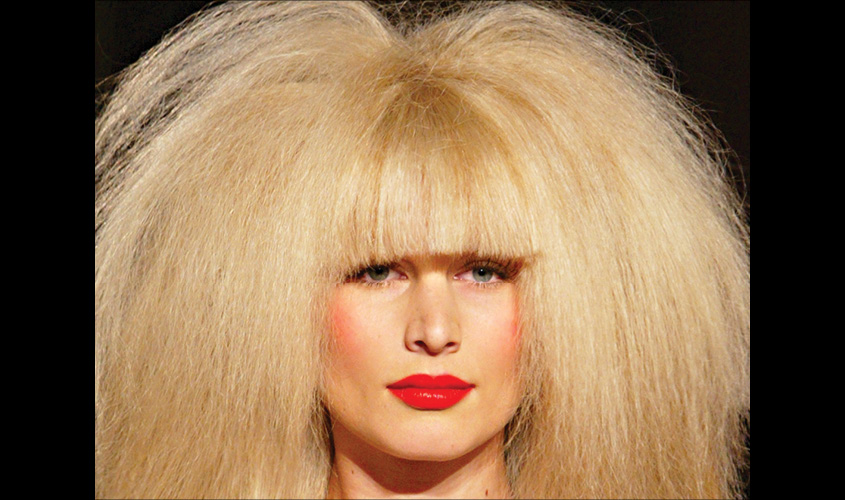The bouffant is back!
The hairstyle, known for its round shape, with hair swept off the face and shellacked into place with quite a bit of hair spray, is symbolic of all that is retro. Think of Catherine Deneuve, Betty Draper in “Mad Men” and multiple first ladies (Lady Bird Johnson, Betty Ford, Jacqueline Kennedy).
But the bouffant has made some notable appearances in fashion in the past month or so. Bella Hadid had one at the Marc Jacobs show in February. She wore a fitted black dress and white gloves, and her hair, styled by Guido Palau, was reminiscent of Anne Bancroft as Mrs. Robinson in “The Graduate.”
Kaia Gerber was given a similar hairstyle in a Loewe publication showcasing its spring 2020 womenswear, with hair sculpted into place by Simone Mason while posing in gowns on the grounds of the Isamu Noguchi Garden of Peace in Paris. For the February cover of Self Service magazine, blond model Rebecca Longendyke has hair styled by Duffy — just one name — with a few variations: wavy, messy, even short.
The current CR Fashion Book with Kim Kardashian West, Naomi Campbell and Cher on alternate covers has the threesome posing as a biker gang in long brunette bouffants with bangs.
“The inspiration was the 1960s and Priscilla Presley,” said Serena Radaelli, who did Cher’s hair. “Cher said, ‘Excuse me, I was alive then,’ and showed us photos of herself in the ’60s.
“Big hair is fearless in a sense,” Radaelli said. “The modernity for this shoot was the length of the hair. It didn’t actually take that long to do.”
The unspoken message of the bouffant was always that it was high maintenance.
“They used to be this glaring symbol that you were a lady of the leisure class, right?” said Stellene Volandes, editor-in-chief of Town & Country. “They said, ‘Yes, I have time to go to Kenneth and spend the afternoon there and have him tease my hair high and eat sandwiches from William Poll.’ ”
She was referring to hairdresser Kenneth Battelle, who was a master of the bouffant. Marilyn Monroe and Kennedy were clients.
Volandes said she would send those curious about the bouffant to stylists who know their way around an uptown clientele: John Barrett, Valery Joseph, Julien Farel or Serge Normant — or to Paul Podlucky’s apartment salon on New York’s East 67th Street for real Upper East Side verisimilitude. In short, it’s rich lady hair, perfect for showing off jewelry. Hadid at Marc Jacobs was draped in diamonds. Or think of Kennedy at the state dinner for the Shah of Iran with a sunburst brooch from the London jeweler Wartski in her hair. Rachel Tashjian, 30, a style writer at GQ who occasionally wears her own platinum blond hair in a baby bouff, said that the bouffant looks both back and forward. It’s looking back at visual culture and trends of the 1960s and ’70s and also taking note of bourgeois ideas around a lady of leisure.
“There is real emerging interest in the performance of getting dressed the way a woman without a job might have, the way dressing was described in Diana Vreeland’s memoir,” she said. Vreeland, an editor of Vogue in the 1960s, wore her jet-black hair pulled off her face into, yes, a bouffant, perhaps best to showcase her signature red blush. Yet what the bouffant also conveys is how we invest time on ourselves right now. “There is interest in rigor and self-preservation and ritual around taking care of yourself, and that extends to skin care and to grooming and the way we dress,” Tashjian said. “If you spend money on Botox or filler or whatever self-care for beautiful skin, you want people to see it, so this renewed idea of scraping the hair away
She recommended L’Oréal Paris Elnett Satin Hairspray, which came on to the market in the 1960s. Its gold packaging still has a drawing of a lady with a bouffant. Illeisha Lussiano, a stylist who owns the Way, a salon in Chinatown in Manhattan, noted that the bouffant “is not strictly a white look.” “Diana Ross and the Supremes — and really a lot of women in Motown — wore them,” she said. The contemporary twist may not be just how they’re styled or which clothes they’re paired with, but the wearer himself. In January, designer Nicholas Daley sent male models down the runway in London with curly, swept-back, almost mulletlike takes on a bouffant.
Men in a bouffant feels right, Lussiano said. “I’d really like to see Harry Styles in one.”
© 2020 The New York Times

